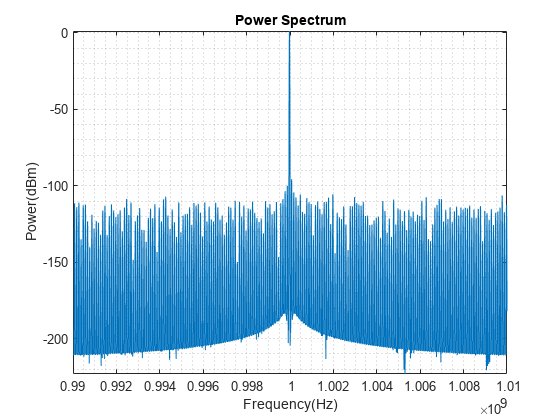Acquire Spectral Data from Vector Signal Transceiver Using NI-RFSA Instrument Driver
This example shows how to connect to a simulated NI™ PXIe-5841 Vector Signal Transceiver (VST) and acquire a finite amount of spectral data from it.
Connect to Instrument
Connect to a simulated VST instrument using the ividev function. For this example, specify the driver name as niRFSA, the resource name as PXI1Slot2, and the IVI driver setup name-value argument as Model:5841.
If you do not know your instrument's resource name, you can identify it from the NI Measurement and Automation Explorer (NI MAX) software. Alternatively, you can leave the resource name unspecified ("") for simulated hardware. The driver setup is also optional. If you do not specify a name-value argument for the driver setup, ividev uses default setup values. For more information about default argument values, see ividev.
isSimulated =true; if isSimulated dev = ividev("niRFSA", "PXI1Slot2", Simulate=true, DriverSetup="Model:5841") else dev = ividev("niRFSA", "PXI1Slot2") end
dev =
niRFSA with properties:
Model: "NI PXIe-5841"
Manufacturer: "National Instruments"
SerialNumber: ""
ResourceName: "PXI1Slot2"
VendorDriver: "niRFSA"
Simulate: 1
ChannelIDs: "0"
FIFOEndpointIDs: "FIFOEndpoint0"
UserSourceIDs: "usersource0"
Vertical: [1x1 Vertical]
SignalPath: [1x1 SignalPath]
Acquisition: [1x1 Acquisition]
Clocking: [1x1 Clocking]
Triggers: [1x1 Triggers]
Events: [1x1 Events]
DeviceCharacteristics: [1x1 DeviceCharacteristics]
PeerToPeer: [1x1 PeerToPeer]
ConfigurationList: [1x1 ConfigurationList]
InherentIVIAttributes: [1x1 InherentIVIAttributes]
Deembedding: [1x1 Deembedding]
SelfCalibration: [1x1 SelfCalibration]
FactoryCalibration: [1x1 FactoryCalibration]
ExternalAlignment: [1x1 ExternalAlignment]
DeviceSpecific: [1x1 DeviceSpecific]
AcquisitionType: IQ
Show all functions
Configure Acquisition Properties
Configure the VST to acquire spectral data, centered around a frequency of 1 GHz, on channel "0". For single channel devices, you do not need to specify the channel (use ""). Set the following parameters to the specified value:
Reference clock — onboard clock
Acquisition type — spectrum
Reference level — 0 dB
Start frequency — 990 MHz
Stop frequency — 1010 MHz
Resolution bandwidth — 10 KHz
Explore different options by using tab completion in the Live Editor.
ch = "0"; configureRefClock(dev, "OnboardClock", 1e7); configureAcquisitionType(dev, "SPECTRUM"); configureReferenceLevel(dev, ch, 0); configureSpectrumFrequencyStartStop(dev, ch, 990e6, 1010e6); configureResolutionBandwidth(dev, ch, 10e3);
Acquire Spectrum
Acquire spectral data at the spectral lines determined by the acquisition configuration.
numSpectralLines = dev.Acquisition.Spectrum.NumberOfSpectralLines;
timeout = 10; % sec
[powerSpectrumData, spectrumInfo] = readPowerSpectrumF64(dev, ch, timeout, numSpectralLines);Plot Spectrum
Construct the frequency values vector using information from the spectrumInfo structure.
f0 = spectrumInfo.initialFrequency; fincr = spectrumInfo.frequencyIncrement; n = double(spectrumInfo.numberOfSpectralLines); f = f0 + fincr.*(0:n-1);
Display spectral data.
plot(f, powerSpectrumData) axis tight grid minor title("Power Spectrum") xlabel("Frequency(Hz)") ylabel("Power(dBm)")

Clean Up
Disconnect and clear the ividev object from the workspace.
clear devSee Also
ividriverlist | ividevlist | ividev
Topics
- Use NI-RFSA and NI-RFSG Instrument Drivers
- Acquire I/Q Data from Vector Signal Transceiver Using NI-RFSA Instrument Driver
- Generate I/Q Data from Vector Signal Transceiver Using NI-RFSG Instrument Driver
- Generate I/Q Data from Vector Signal Transceiver Using NI-RFSG Scripting
- Acquire Parameterized I/Q Data from Vector Signal Transceiver by Parameter Sweeping